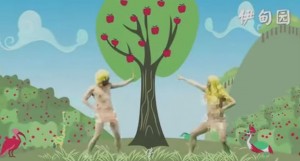‘Little Apple’: The hit song all of China is singing

BEIJING – Has China found its own “Gangnam Style?” From Beijing parks to Shanghai skyscrapers and in Guangzhou factories to karaoke rooms in Macau, people are singing “Little Apple” – a song apparently so catchy it has even won over the army and police.
Calling themselves the “Chopsticks Brothers”, Xiao Yang and Wang Taili are neither brothers nor composers, but are responsible for a hit that has become a nationwide phenomenon.
“Xiao Pingguo” (Little Apple) was originally intended to promote their latest film when it was released in July, but has proven to be an earworm – the kind of song so insistent it gets stuck in the brain.
“This song is easy to follow, the pace is basic and repetitive. Even the old ladies in public gardens are learning it quickly,” said Zeng Qiumei, a marketing manager from Sichuan province.
The accompanying music video has notched up more than 50 million views on Chinese video sites such as Sohu, iQiyi and Youku.
Article continues after this advertisementThe surreal six-minute clip begins with a botched plastic surgery operation before cutting to Xiao and Wang naked in the Garden of Eden.
Article continues after this advertisementThey then appear in a number of sequences, including dressed as mermaids on a beach or acting as village children.
The lyrics are largely nonsense, with the chorus running “You’re my little apple, you’re my little apple.”
Even so, and perhaps aided by relaxed attitudes towards intellectual property in China, the tune has become ubiquitous – whether playing on smartphone ringtones to shopping malls, nightclubs and gyms.
Moves like ‘Da Ma’
The People’s Liberation Army in the city of Xian has used the song in a recruitment video, while police in Shandong last month modified the lyrics for a broadcast warning about phone-banking scams.
“We changed the words to make people aware,” a police officer said in comments broadcast on CCTV.
And a clip showing soldiers dancing to “Xiao Pingguo” with child survivors of an August earthquake that killed 600 people in the southwest became an online sensation.
There are countless other amateur videos of groups of people dancing to the song, including air stewardesses, cheerleaders, firefighters and students.
One parody brings together North Korean leader Kim Jong-Un, Barack Obama, Vladimir Putin, Japanese Prime Minister Shinzo Abe and the Secretary General of the UN Ban Ki-moon.
The song’s success has also put a spotlight on “Da Ma” – the old ladies who gather every morning and evening to dance in city squares across China.
Zheng Xiaomin, a 76-year-old retiree in Beijing, said the Xiao Pingguo dance phenomenon has brought more people together, although she was happy to remain a spectator.
“In a park, it is usually embarrassing to be seen putting your hands on the shoulder or hip of a partner,” said the former typographer, who used to translate official documents into the dialects of ethnic minorities.
“But with Xiao Pingguo that’s not the case,” she added.
Not K-pop
Despite its nationwide appeal, there are few expectations that “Little Apple” will become the kind of global phenomenon that was “Gangnam Style”, the stratospheric 2012 hit by South Korea’s Psy that has been viewed on YouTube more than 2.1 billion times.
In contrast the Chopstick Brothers’ video (https://www.youtube.com/watch?v=LzHFD1sEqpE) has only clocked up three million hits on the site, which is blocked in China by the country’s vast network of Internet controls, despite South Korean K-pop singer and actress Bae Seul-Ki also featuring prominently.
Experts say Xiao Pingguo lacks the Westernized ingredients that helped Psy find such success.
Chinese pop music has remained within its borders — unlike K-pop which has assimilated various influences to help it conquer Southeast Asia and Japan as well as gain attention beyond the continent, Chinese music critic Hao Fang told AFP.
“China does not focus on the development of its cultural and creative industries” in the way that South Korea does, he said.
“The songs are stylistically outdated. ‘Xiao Pingguo’ takes on a disco beat heard in 1980s and 1990s China. This prevents it from competing with current pop music from the rest of the world,” said Fang, decrying its popularity as “definitely a shame for the country”.
And for all its mass appeal, it seems that “Xiao Pingguo” still has a long way to go before it wins the hearts and minds of the state.
After President Xi Jinping called on artists to promote socialism and serve the people last week, China’s official news agency Xinhua decried “vulgar, repetitive and fast-food art works”.
“Not a single Chinese pop song has gained as much international popularity as ‘Gangnam Style’ did,” it lamented.
